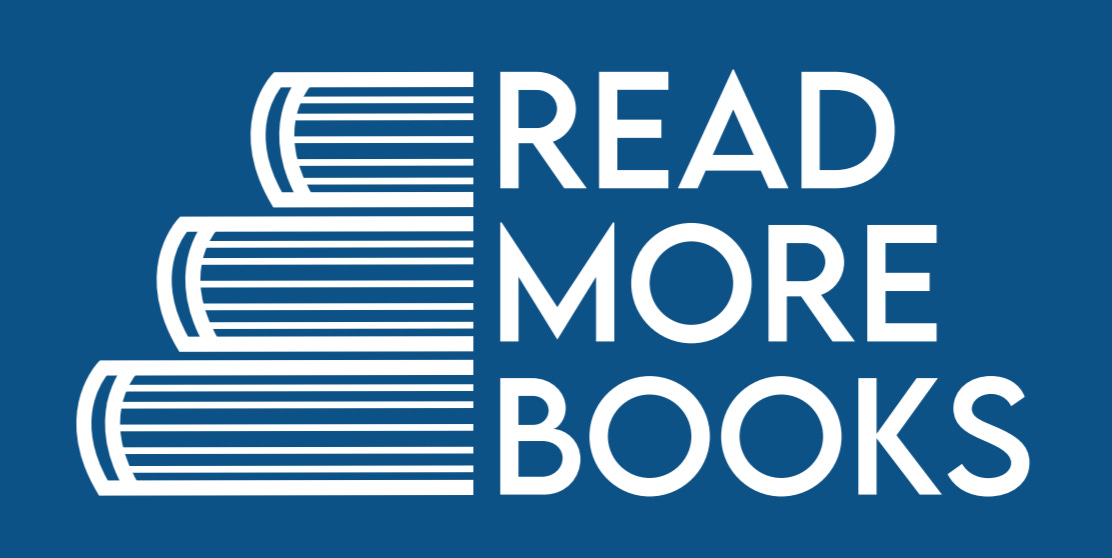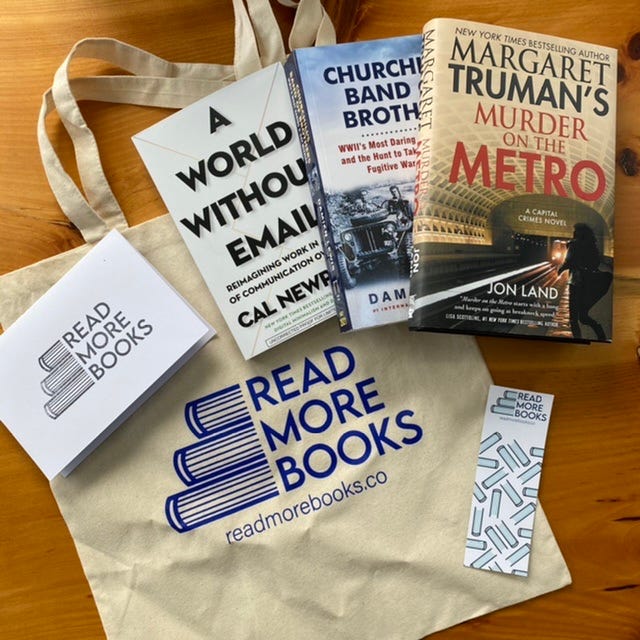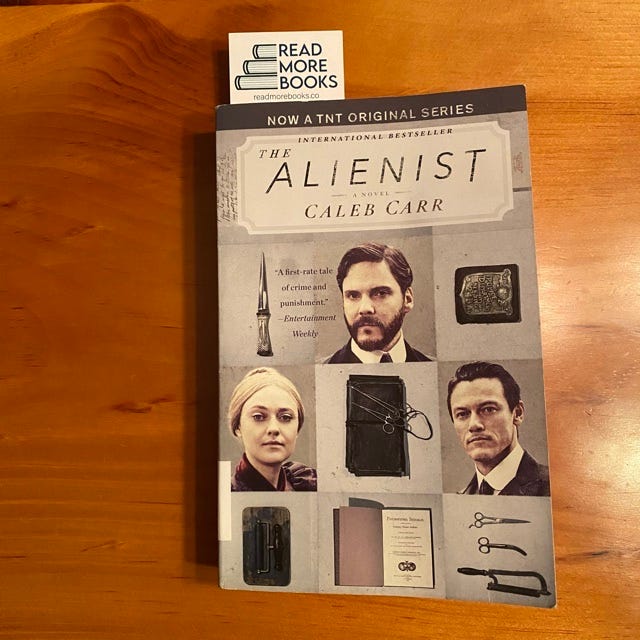What to Read Next (No. 169): mystery of the month + interview with Morgan Housel
I have a bit of a smorgasbord edition for you today. First, I’ll show off some Read More Books swag. Then there’s our mystery of the month, followed by a great article I wanted to share with you all. Finally, I’m excited to feature a fun interview with personal finance pro Morgan Housel.
Let’s jump right in.
Read More Books Swag!
Bookmark. Books (from my personal stash). Tote bag!
This is the package of goodies that Founding subscribers will be receiving in the next couple weeks. The availability of this subscription level tends to depend on how many books publishers are sending me at any given moment. Currently, I have a bit of a glut of early review copies, so the Founding subscription is again available. Learn more here, or just go ahead and subscribe:
P.S. If that bookmark is catching your eye, you can get that in your mailbox when you subscribe at the standard level of $5/month.
Mystery of the Month: The Alienist by Caleb Carr
Published: 1994 | Pages: 495
I hadn’t heard of this historical mystery novel until I came across a tweet that mentioned it (thank you @benjamin_oc!); I looked it up, was highly intrigued by the premise, and immediately requested it from my beloved JeffCo library system.
Though the subject matter is rather grim—a series of grotesque murders of adolescent prostitutes—the characters, the setting (1890s New York City, in all its squalid splendor), and the slow psychological burn of catching a serial killer make it well worth reading.
First, the characters: Psychologist Lazlo Kreizler is one of the country’s first true criminal profilers (psychologists were called “alienists” back then, hence the name of the book). In that era, it was a frowned upon profession which was deemed to be pseudoscience. When there were no other clues to work from, Kreizler used psychological insights to get a lead on the killer. Partner-in-sleuthing John Moore, a friend and reporter, was brought along for the ride and narrates our tale. Sara Howard, one of the only women to work for the police department (albeit in a secretarial role, to start with), is one of the most intrepid women I’ve found in a mystery. NYC Police Commissioner Theodore Roosevelt also plays a rather large role, which is pretty fun. The characters are as compelling as you’ll find in the genre.
Second, the setting: Few novels I’ve read have been as evocative of a specific place/time and so rich with historical detail. Carr makes Gilded Age NYC come alive, from its gastronomical delights to its seedy tenements and everything in between. Every time I opened the book it felt like a true portal to that era.
Third, the slow burn: This is not a fast read. Its 500+ pages took me longer than usual and it’s one of those books that I could only read without distraction. Until closer to the end, there’s just not a ton of action; given the star of the book, it should be no surprise that there’s plenty of conversation between our sleuths trying to decode the perpetrator’s personality. It’s part Sherlock Holmes, part Dexter, part Silence of the Lambs.
Sometimes a long, languid mystery is just what you’re in the mood for. When that’s the case, pick up The Alienist and let me know what you think.
If You Read One Article This Week
The Therapy-App Fantasy at The Cut. I hear ads for BetterHelp on more podcasts than not these days, so I read this piece with great interest. One memorable note from this long read:
“Robot therapists do exist, at least sort of. At this stage, they’re more like interactive workbooks. Woebot, developed by a team at Stanford in 2017, is a chatbot that walks users through the basics of CBT. Woebot asks how you’re feeling, and you respond by selecting among emoji moods. Woebot asks you to write out your anxious or unhappy thoughts, then quizzes you as to which cognitive distortions (‘Black-and-white thinking’? ‘Mind-reading’?) your thinking may evince. ‘I don’t always understand everything you write,’ Woebot says, ‘but sometimes the act of sharing is just as good.’ The act of sharing, though, is only half of the responsive give-and-take that clients expect from therapy.”
For even more links like this, sent in members-only emails, sign up as a paid subscriber:
A Few Bookish Questions With Morgan Housel
1. Your book, The Psychology of Money, is more even-keeled than most personal finance advice out there. Are there psychology books that have particularly helped you hone your financial philosophy?
Dan Gardner wrote a book called The Science of Fear that I love. It’s so easy to read, but had a big impact on how I think about risk in the world. Everyone is flawed but few know it or want to admit it.
2. A lot of finance bros seem to only read non-fiction—especially non-fiction that's directly related to finance, tech, productivity, self-help, etc. Is there a case for reading beyond those types of books?
Finance is just the study of how people behave with money. And behavior is a really broad field. There’s so much to learn about how people think and behave from sociology, psychology, politics, history, physics, biology . . . on and on. I almost never read investing books. It’s too narrow a lens.
3. Do you have any go-to publications/magazines for getting your news and the most up-to-date, well-rounded information?
I read the traditional stuff. WSJ, Bloomberg, NYT, Economist. They’re great. But most of what I read is stuff that has nothing to do with investing, or non-professional blogs. We are in the golden age of free, high-quality content.
4. What do you read in your spare time for entertainment or relaxation? Any favorite genres or authors?
For years I was on a World War II kick. It’s such a fascinating period because it’s a period when there was more hardship, suffering, confusion, stress, tragedy, hope, determination, fear . . . you could go down this list all day . . . and it’s well-documented in a way, say, the Dark Ages were not. [Morgan told me in a follow-up email that his favorite among the WWII books was Rick Atkinson’s The Guns at Last Light.]
I’m now on an Apollo Mission kick. Putting a human on the moon is probably the coolest thing humans have ever done, and maybe ever will do. A man was walking on a moon within the same lifetime of someone who lived before cars were invented. Just think about that.
5. Any quick-hit recommendations for business, tech, futurist, and/or money books that stand out from the crowd? (Those are all roughly in the same category, to me!)
I recently read a book called The Molecule of More. It’s about dopamine. That’s not a finance book, but dopamine drives so much of what happens in finance, so it kind of is. It’s very good.
6. What are you reading and enjoying now? What's next on your list?
The Splendid and the Vile. It’s about how Winston Churchill kept England together during the blitz, when it was being bombed by the Nazis every night. Absolutely fascinating.




